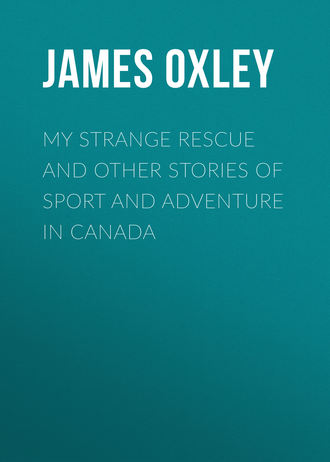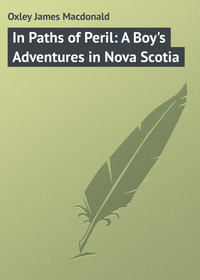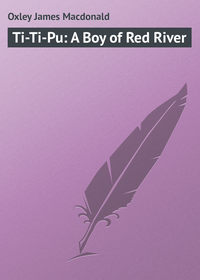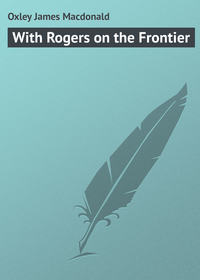 полная версия
полная версияMy Strange Rescue and other stories of Sport and Adventure in Canada
"There's the English mail steamer, Andy, and father says she'll ram her way up through the ice as far as she possibly can. Won't that be grand?"
Shortly after, the two boys left the house, and hastened off down Water Street until they reached a wharf from which they could easily get out upon the ice. They were both good skaters for their age, strong, sure, and speedy, and their first proceeding was to dart away across the harbour, spurting against one another in the first freshness of their youthful vigour, until they had reached the outer edge of the Dartmouth wharves. They then thought it was about time to rest a bit and regain their breath.
"What perfect ice!" gasped Andy. "It's ever so much better than fresh-water ice, isn't it?"
Harvey, being very much out of breath, simply nodded.
Andy was right, too. Whatever be the reason, the finest ice a skater can have is that which forms upon salt water. It has good qualities in which fresh-water ice is altogether lacking.
"Hallo, Andy! there's the steamer," cried Harvey suddenly, having quite recovered his wind.
Sure enough, just beyond George's Island the great dark hull of the ocean greyhound was discernible, as with superb majesty she solemnly pushed her way through the thin, ragged ice which marked where the current had been too strong for the breastplate to form properly. Full of impatience to watch the steamer's doings, the two boys hurried toward her at their best pace, so that in a few minutes they were not far from her bows, and as far out upon the ice as they thought it safe to venture.
No doubt it was a rare and thrilling sight, and not only the boys, but all who were upon the harbour at the time, gathered to witness it. The steamer was now in the thick, well-knitted ice, and could no longer force her way onward steadily, so she had to resort to ramming. Her course lay parallel to the wharves, and about one hundred yards or more from them. Reversing her engines, she would back slowly down the long narrow canal made in her onward progress until some hundreds of yards away; then coming to a halt for a moment, she would begin to go ahead, at first very slowly, almost imperceptibly, then gradually gathering speed as the huge screw spun round, sending waves from side to side of the ice-walled lane; faster and still faster, while the spectators, thrilling with excitement, held their breath in expectation; faster and still faster, until at last, with a crash that made even the steamer's vast frame tremble from stem to stern, the sharp steel bow struck the icy barrier, and with splintering sound bored its way fiercely through, but losing a little impetus with every yard gained, so that by the time the steamer had made her own length her onset was at an end, and sullenly withdrawing, she had to renew the attack.
As at the beginning, so at the end of the steamer's charge, there was a moment when she stood perfectly still. This was when all her impetus was exhausted, and for a brief second she paused before rebounding and backing away. During this almost imperceptible instant it was just possible for a swift skater to dart up and touch the bow as it towered above the ice hard pressed against it. There was absolutely nothing in such a feat except its daring. Yet – and perhaps for that very reason – there were those present rash enough to attempt it. Big Ben Hill, the champion speed skater, was the first, and he succeeded so admirably that others soon followed his example. Harvey and Andy were intensely interested spectators as one after another, darting up just at the right moment, touched with outstretched finger-tips the steamer's bow, and then, with skilful turn, swung safely out of the way.
"I'm going to try it too," said Andy, under his breath.
"You'll do nothing of the kind, Andy," answered Harvey. "It's just touch and go every time."
"Yes, I will. Buntie Boggs just did it, and if he can do it, I can," returned Andy eagerly.
As he spoke, the steamer came gliding on for another charge. With eyes flashing, nerves tingling, muscles tense, and heart beating like a trip-hammer, Andy awaited her onset. Crash, crack, splinter; then pause – and like an arrow he flew at her bow. Harvey tried to hold him back, but in vain. Over the smooth ice he shot, and right up to the big black bow. With a smile of triumph he stretched out his hand, when – crash! the ice opened suddenly beneath his very feet, and he pitched headlong into the dark swirling water.
A cry of horror went up from the crowd, and with one impulse they moved as closely as they dared to the edge of the open water. There was a moment of agonized silence, then a shout of joy as a fur cap, followed by a dark body, emerged from the water, and presently Andy's frightened face was turned imploringly toward them. He could swim well enough, and keep himself afloat all right; but the steamer retreating along the narrow canal created a strong current, which bore him after her, and he was in no slight danger.
"Save him! oh, save him, won't you?" cried Harvey, grasping Ben Hill's arm imploringly.
"I will that, my lad; never fear."
But how was it to be done? All along the edge of the canal in which Andy was struggling for life, and for some yards from it, the ice was cracked and broken into jagged fragments, making it impossible for any one to approach near enough to the boy to help him out, and for the same reason he was unable to climb out by himself.
"A rope! a rope! I must have a rope!" shouted Ben Hill, looking eagerly around him. His quick eye fell upon a schooner lying at the head of a wharf near by.
"Cheer him up, boys," cried Ben; "I'll be back in a second;" and like a flash he sped off toward the schooner.
Almost in less time than it takes to tell it he reached her side, sprang over the low bulwarks on to the deck, snatched up a coil of rope that lay upon the cabin poop, leaped back to the ice, and with mighty strides came down toward the water, amid the cheers of the onlookers.
"Look out for yourself, Andy!" Ben shouted, as he drew close to the canal's edge, coiling the rope for a throw. "Now, then, catch!" and the long rope went swirling through the air.
A cry of disappointment from the crowd announced that it had fallen short.
"All right, Andy – better luck next time," called Ben, as he rapidly recovered the rope for another fling. Venturing a little nearer, and taking more pains, he flung it out with all his strength, and this time a shout of joy proclaimed that his aim had been true.
"Put it under your arms," called out Ben.
Letting go the cake of ice to which he had been clinging, Andy slipped the rope under his arms.
"Now, then, hold tight." And slowly, carefully, hand over hand, big Ben, with feet braced firmly and muscles straining, drew Andy through the broken cakes and up upon the firm safe ice. The moment he was out of danger a shout burst forth from the relieved spectators, and they crowded eagerly round rescued and rescuer.
"Out of the way there, please! out of the way!" cried Ben, as he gathered Andy's dripping form up in his arms. "This lad must be beside a fire as soon as possible."
Fortunately the crew were still on board the schooner from which the precious rope had been borrowed, and they had a fine fire in the cabin. Into this warm nook Andy was borne without delay. His wet clothes were soon stripped off, and he was turned into a bunk until dry ones could be procured. A messenger was despatched with the news to his home, and before long his mother, with feelings strangely divided between smiles and tears, drove down for the boy who had come so near to being lost to her for ever.
That evening, as Harvey and Andy were sitting by the fireside recounting for the tenth time the stirring incidents of the day, and voicing together the praises of big Ben Hill, Andy, with a sly twinkle of the eye, turned to Harvey, saying, "Do you remember saying to me that it was a touch and go every time?"
"Yes, Andy; what of it?"
"Well, I was just thinking that in my case I didn't touch, but I went – under the water, and I won't be in a hurry to try it again."
THE CAVE IN THE CLIFF
"Say, Bruce, don't you think we could manage to put in a whole week up among the hills this autumn?" asked Fred Harris of Bruce Borden, as the two friends strolled along together one September afternoon through the main street of Shelburne, one of the prettiest towns upon the Nova Scotian sea-board.
"I guess so, Fred," responded Bruce promptly. "Father promised me a week's holiday to spend any way I chose if I stuck to the shop all summer, and I've been thinking for some time what I would do. That's a grand idea of yours. When would we go?"
"About the first of next month would be the best time, wouldn't it? We could shoot partridges then, you know, and there won't be any mosquitoes or black flies to bother us."
"All right, Fred. Count me in. I'm just dying for a shot at the partridges; and, besides, I know of a lake 'way up in the hills where there are more trout than we could catch in a year, and splendid big fellows, too! Archie Mack was telling me about it the other day."
"Why, that's the very place I wanted to go to; and it was Archie who told me about it, too," said Fred. "I'll tell you what, Bruce, we must get Archie to come with us, and then we'll have a fine time for sure."
"Hooray! You've got the notion now," cried Bruce with delight. "Archie's a splendid fellow for the woods, and he's such a good shot; he hardly ever misses. Why, I wouldn't mind meeting a bear if Archie was present."
"Ah, wouldn't you though, Mr. Bruce!" laughed Fred. "I guess if either you or I were to come across a bear he'd see more of our heels than our face. I know I wouldn't stop to make his acquaintance."
"I'll warrant Archie wouldn't run from any bear," said Bruce, "and I'm not so sure that I would either. However, there's small chance of our seeing one, so it's not much good talking about it. But I must run back to the shop now. Won't you come in after tea to-night, and we'll make our plans?"
Fred promised he would, and went on down the street, while Bruce returned to his place behind the counter; and if he was a little absent-minded in attending to the customers, so that he gave Mrs. White pepper instead of salt, and Mrs. M'Coy tea instead of coffee, we must not be too hard upon him.
Bruce Borden was the son of one of the most thriving shopkeepers in Shelburne, and his father, after letting him go to school and the academy until he was sixteen years of age, had then put an apron on him and installed him behind the counter, there to learn the management of the business, which he promised him would be Robert Borden and Son in due time if Bruce took hold of it in the right way. And Bruce did take hold. He was a bright, active, energetic lad, with a pleasant manner, and made an excellent clerk, pleasing his father so well that as the first year's apprenticeship was drawing to a close, Mr. Borden, quite of his own accord, made glad Bruce's heart by saying that he might soon have a whole week's holiday to do what he liked with, before settling down to the winter's work.
Bruce's friend, Fred Harris, as the son of a wealthy mill-owner who held mortgages on half the farms in the neighbourhood, did not need to go behind a counter, but, on the contrary, went to college about the same time that Bruce put on his apron. He was now at home for the vacation, which would not end until the last of October. He was a lazy, luxurious kind of a chap, although not lacking either in mind or muscle, as he had shown more than once when the occasion demanded it. Bruce and he had been playmates from the days of short frocks, and were very strongly attached to one another. They rarely disagreed, and when they did, made it up again as soon as possible.
In accordance with his promise, Fred Harris came to Mr. Borden's shop that same evening just before they were closing up, bringing Archie Mack with him; and after the shutters had been put on and everything arranged for the night, the three boys sat down to perfect their plans for the proposed hunting excursion to the hills.
Archie Mack bore quite a different appearance from his companions. He was older, to begin with, and much taller, his long sinewy frame betokening a more than usual amount of strength and activity, he had only of late come to Shelburne, the early part of his life having been spent on one of the pioneer farms among the hills, where he had become almost as good a woodsman as an Indian, seeming to be able to find his way without difficulty through what looked like trackless wilderness, and to know everything about the birds in the air, the beasts on the ground, or the fish in the waters. This knowledge, of course, made him a good deal of a hero among the town boys, and they regarded acquaintance with him as quite a privilege, particularly as, being of a reserved, retiring nature, like all true backwoodsmen, it was not easy to get on intimate terms with him. He was now employed at Mr. Harris's big lumber-mill, and was in high favour with his master because of the energy and fidelity with which he attended to his work.
"Now then, Fred, let's to business," said Bruce, as they took possession of the chairs in the back office. "When shall we start, and what shall we take?"
"Archie's the man to answer these questions," answered Fred. "I move that we appoint him commander-in-chief of the expedition, with full power to settle everything."
"You'd better make sure that I can go first," said Archie. "It won't do to be counting your chickens before they're hatched."
"Oh, there's no fear of that," replied Fred. "Father promised me he'd give you a week's holiday so that we could go hunting together some time this autumn, and he never fails to keep his promises."
"All right then, Fred, if you say so. I'm only too willing to go with you, you may be sure. So let us proceed to business," said Archie. And for the next hour or more the three tongues wagged very busily as all sorts of plans were proposed, discussed, accepted, or rejected, Archie, of course, taking the lead in the consultation, and usually having the final say.
At length everything was settled so far as it could be then, and, very well satisfied with the result of their deliberations, the boys parted for the night. As soon as he got home, Fred Harris told his father all about it, and readily obtained his consent to giving Archie a week's leave. There was, therefore, nothing more to be done than to get their guns and other things ready, and await the coming of the 1st of October with all the patience at their command.
October is a glorious month in Nova Scotia. The sun shines down day after day from an almost cloudless sky; the air is clear, cool, and bracing without being keen; the ground is dry and firm; the forests are decked in a wonderful garb of gold and flame interwoven with green whose richness and beauty defy description, and beneath which a wealth of wild fruit and berries, cherries, plums, Indian pears, blackberries, huckleberries, blueberries, and pigeon-berries tempts you at every step by its luscious largess. But for the sportsman there are still greater attractions in the partridges which fly in flocks among the trees, and the trout and salmon which Hash through the streams, ready victims for rod or gun.
Early in the morning of the last day in September the three boys set out for the hills. It would be a whole day's drive, for their waggon was pretty heavily loaded with tent, stove, provisions, bedding, ammunition, and other things, and, moreover, the road went up-hill all the way. So steep, indeed, were some of the ascents that they found it necessary to relieve the waggon of their weight, or the horse could hardly have reached the top. But all this was fun to them. They rode or walked as the case required; talked till their tongues were tired about what they hoped to do; laughed at Prince and Oscar, their two dogs – one a fine English setter, the other a nondescript kind of hound – as they scoured the woods on either side of the road with great airs of importance; scared the squirrels that stopped for a peep at the travellers by snapping caps at them; and altogether enjoyed themselves greatly.
Just as the evening shadows were beginning to fall they reached the farm on which Archie Mack's father lived, where they were to spend the night, and to leave their waggon until their return from camp. Mr. Mack gave them a hearty welcome and a bountiful backwoods supper of fried chicken, corn-cake, butter-milk, and so forth, for which they had most appreciative appetites; and soon after, thoroughly tired out, they tumbled into bed to sleep like tops until the morning.
"Cock-a-doodle-doo! Time to get up! Out of bed with you!" rang through the house the next morning, as Archie Mack, who was the first to waken, proceeded to waken everybody else.
"Oh dear, how sleepy I am!" groaned Fred Harris, rubbing his eyes, and feeling as though he had been asleep only a few minutes.
"Up, everybody, no time to waste!" shouted Archie again; and with great reluctance the other two boys, dragging themselves out on the floor, got into their clothes as quickly as they could.
Breakfast wras hurriedly despatched, and soon after, with all their belongings packed on an old two-wheeled cart drawn by a patient sure-footed ox, and driven by Mr. Mack himself, the little party made their way through the woods to their camping-ground, which was to be on the shore of the lake Archie had been telling them about. Without much difficulty they found a capital spot for their tent. Mr. Mack helped them to put it up and get everything in order, and then bade them good-bye, promising to return in six days to take them all back again.
The first four days passed away without anything of special note happening. They had glorious weather, fine fishing, and very successful shooting. They waded in the water, tramped through the woods, ate like Eskimos, and slept like stones, getting browner and fatter every day, as nothing occurred to mar the pleasure of their camp out. On the afternoon of the fourth day they all went off in different directions, Fred taking Prince the setter with him, Bruce the hound Oscar, and Archie going alone. When they got back to camp that evening Bruce had a wonderful story to tell. Here it is in his own words: —
"Tell you what it is, fellows, we've a big contract on hand for to-morrow. You know that run which comes into the lake at the upper end. Well, I thought I'd follow it up and see where it leads to; so on I went for at least a couple of miles till I came to a big cliff. I felt a little tired, and sat down on a boulder to rest a bit. Oscar kept running around with his nose at the ground as if he suspected something. All of a sudden he stopped short, sniffed very hard, and then with a loud, long howl rushed off to the cliff, and began to climb a kind of ledge that gave him a foothold. I followed him as best I could; but it wasn't easy work, I can tell you. Up he went, and up I scrambled after him, till at last he stopped where there was a sort of shelf, and at the end of it a big hole in the rock that looked very much like a cave. He ran right up to the hole and began to bark with all his might. I went up pretty close, too, wondering what on earth Oscar was so excited about, when, the first thing I knew, one bear's head and then another poked out of the hole, and snarled fiercely at Oscar. I tell you, boys, it just made me creep, and I didn't wait for another look, but tumbled down that ledge again as fast as I could and made for camp on the dead run. It was not my day for bears."
"You're a wise chap, Bruce," said Archie, clapping him on the back. "You couldn't have done much damage with that shot-gun, even if you had stayed to introduce yourself. I'm awfully glad you've found the cave. Father told me about these bears, and said he'd give a sovereign for their tails. There's an old she-bear and two half-grown cubs. I guess it was the cubs you saw. The old woman must have been out visiting."
"If I'd known that they were only cubs I might have tried a dose of small shot on them," said Bruce regretfully.
"It's just as well you didn't," answered Archie. "We'll pay our respects to them to-morrow. I'll take my rifle, and you two load up with ball in both barrels, and then we'll be ready for business."
So it was all arranged in that way, and then, almost too excited to sleep, the three lads settled down for the night, which could not be too short to please them.
They were up bright and early the next morning, bolted a hasty breakfast, and then proceeded to clean and load their guns with the utmost care. Fred and Bruce each had fine double-barrelled guns, in one barrel of which they put a bullet, and in the other a heavy load of buckshot. Archie had his father's rifle, and a very good one it was, which he well knew how to use. Besides this each carried a keen-bladed hunting-knife in his belt.
Thus armed and accoutred they set forth full of courage and in high spirits. They had no difficulty in finding and following Bruce's course the day before, for Oscar, who seemed to thoroughly understand what they were about, led them straight to the foot of the cliff, and would have rushed right up to the cave again if Archie had not caught him and tied him to a boulder. Then they sat down to study the situation. For them to go straight up the ledge with the chance of the old bear charging down upon them any moment would be foolhardy in the extreme. They must find out some better way than that of besieging the bears' stronghold.
"Hurrah!" exclaimed Archie, after studying the face of the cliff earnestly. "I have it! Do you see that ledge over there to the left? If we go round to the other side of the cliff we can get on that ledge most likely, and it'll take us to right over the shelf where the cave is. We'll try it, anyway."
Holding Oscar tight, they crept cautiously around the foot of the cliff, and up at the left, until they reached the point Archie meant. There, sure enough, they found the ledge two sharp eyes had discovered, and it evidently led over toward the cave just as he hoped. Once more tying the dog, who looked up at them in surprised protest, but was too well trained to make any noise, the boys made their way slowly along the narrow ledge, until at last they came to a kind of niche from which they could look straight down upon the shelf, now only about fifteen feet below them.
"Splendid, boys!" whispered Archie, gripping Fred's arm. "We're as safe as a church-mouse here, and they can't poke their noses out of the cave without our seeing them."
Keeping very still and quiet, the boys waited patiently for what would happen. Then, getting tired of the inaction, Bruce picked up a fragment of rock and threw it down upon the ledge below, where it rattled noisily. Immediately a deep, fierce growl came from the cave, and a moment afterwards the old bear herself rolled out into the sunshine.
"The top of the morning to you, missus!" called out Archie saucily. "And how may your ladyship be feeling this morning?"
At the sound of his voice the bear turned quickly, and catching sight of the three boys in such close proximity to the privacy of her home, uttered a terrible roar of rage, and rearing up on her hind legs, strove to climb the piece of cliff that separated them from her.
Bruce and Fred, who had never seen a wild bear before, shrank terror-stricken into the corner, but Archie, looking as cool as a cucumber, stood his ground, rifle in hand.
"No, no, my lady; not this morning," said he, with an ironical bow. "You're quite near enough already."
Foiled in her first attempt, the great creature gathered herself together for another spring, and once more came toward them with a savage roar. As she did so her broad, black breast was fully exposed. Without a tremor of fear or excitement Archie lifted his rifle to his shoulder and aimed straight at the bear's heart; a sharp report rang out through the clear morning air, followed close by a hideous howl of mingled rage and pain; and when the smoke cleared away the boys, with throbbing hearts, looked down upon a huge black shape that writhed and struggled in the agonies of death. A simultaneous shout of victory burst from their lips and gave relief to their excited emotions.
"Hurrah, Archie! You've done for her," cried Fred, clapping him vigorously on the back.
"Yes. I reckon she won't have any more mutton at father's expense," said Archie with a triumphant smile. "Just look at her now. Isn't she a monster?"







